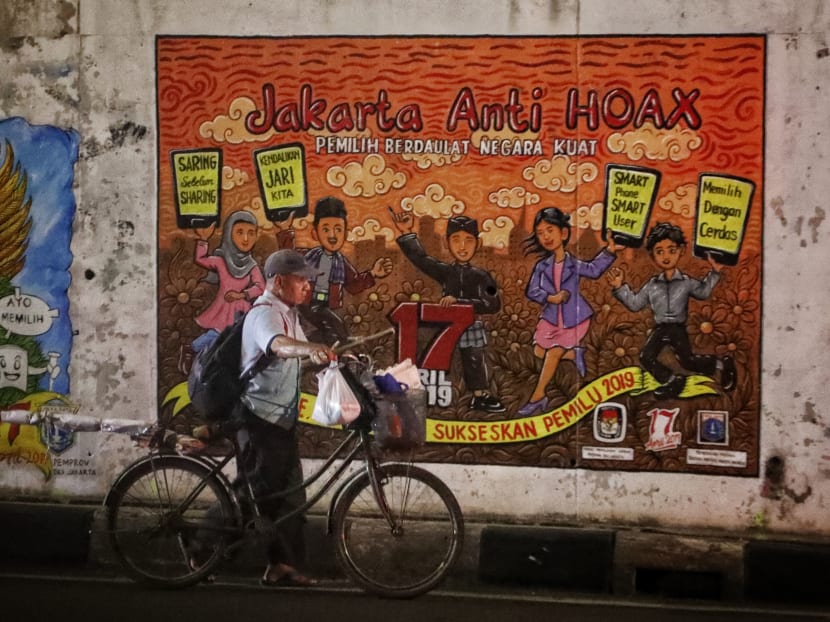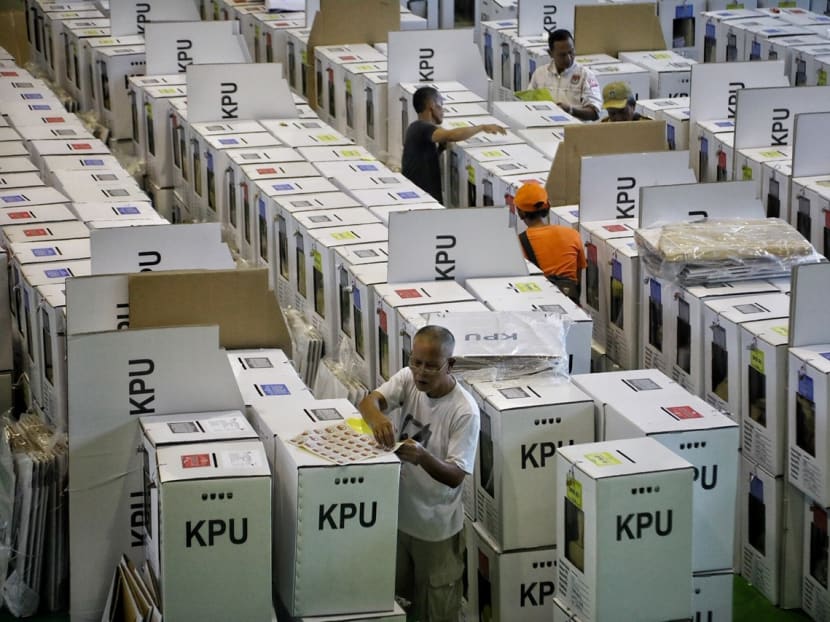A day before Indonesia votes, fact-checkers ramp up efforts to debunk fake news
JAKARTA — With less than a day to go before Indonesia votes for its next President, fact-checkers are doubling down to debunk falsehoods circulating on the Internet.

Political analysts and journalists in Indonesia said the scourge of fake news in the country has worsened in the past few years, aided by a population increasingly connected to mobile phones and the Internet, as well as low digital literacy and educational levels, especially in the rural areas.
JAKARTA — With less than a day to go before Indonesia votes for its next President, fact-checkers are doubling down to debunk falsehoods circulating on the Internet.
On Tuesday (April 16), a group of 30 journalists from 24 local news organisations trawled through social media and messaging platforms for falsehoods, which they verified before setting the facts straight.
Part of an initiative called Cekfakta (or “check facts” in Bahasa Indonesia), the journalists divided themselves into teams and were aided by about 10 undergraduates, who are mostly studying communications and journalism.
The students searched social media platforms such as Facebook, Twitter and Instagram for three items – claims, visuals such as photos and videos, as well as memes.
The team will continue with the fact-checking on polling day on Wednesday, when some 192 million Indonesians will head to the ballot box in a rematch of the 2014 polls. That year, incumbent president Joko Widodo, 57, beat 67-year-old challenger Prabowo Subianto by 6 percentage points.
Read also
17 million first-time voters hold key to Indonesia’s presidency
Fake news causing confusion in Indonesia presidential election
One of the students involved was 20-year-old multimedia and communications undergraduate Nobertos Mario Baskoro, whose eyes were glued to his laptop screen, scanning his TweetDeck.
To sieve out falsehoods, he said the students would type in keywords related to the election – such as “ballot papers”, for instance. They would then go through Facebook or Twitter posts bearing the keywords.
“It is good to be part of this because it also increases our awareness and teaches us how to detect fake news,” Mr Nobertos told TODAY.
After the students identify a possible falsehood, it is channelled to two teams of journalists who then verify the information.
One online falsehood found on Twitter was the claim that Mr Widodo had won 80 per cent of the overseas votes in 2014 because the delivery of votes cast for Mr Prabowo was deliberately delayed.
News reports dug up by one of the journalists, however, indicated that Mr Widodo only won 53.74 per cent of the overseas votes, while his rival secured 46.26 per cent.
The journalist submitted the information to the “final layer of fact-checkers” – a team of five from independent fact-checking organisation Mafindo, which gives the green light if a post contains a falsehood.

As part of the process put in place, one of the journalists then wrote an article debunking the falsehood, which was published on the Cekfakta website before being posted on its social media channels.
Ms Ratna Ariyanti, 37, who is one of Cekfakta’s facilitators and a member of the Alliance of Independent Journalists in Indonesia, said that the goal of the fact-checking exercise on the eve of, and on polling day itself is to prevent voters from being misinformed.
“It is not (about) whether or not there are more falsehoods the day before the polls, because there are many fake news (items) on a daily basis,” she told TODAY. “We just want to make sure that voters are not confused or misled, so that they can vote in an informed manner.”
Political analysts and journalists in Indonesia said the scourge of fake news in the country has worsened in the past few years, aided by a population increasingly connected to mobile phones and the Internet, as well as low digital literacy and educational levels, especially in the rural areas.
Amid increasing religious polarisation, Indonesians are more divided than ever. The proliferation of fake news, which has been dogging the presidential campaigns, is threatening to make matters even worse, they pointed out.
According to the country’s Communications and Information Ministry, 130 of more than 1,200 online political hoaxes and fake news items detected between August 2018 and March this year were related to presidential candidates, political parties and election organisers.
The Cekfakta initiative, started in May last year and supported by Google through its Google News Lab programme, was borne out of a collaboration between 24 news outlets such as Tempo and Kompas.
In the past few weeks, journalists under the initiative have been fact-checking the statements made by candidates during the presidential debates.
Aside from the 24 news organisations that are part of Cekfakta, 75 other news outlets from 15 other cities in Indonesia, such as Medan, have been roped in for the fact-checking exercise on the eve of and on polling day.
Mr Wahyu Dhyatmika, editor-in-chief of news site Tempo and co-founder of Cekfakta, told TODAY that countering fake news is a “countrywide effort”.
“There are hundreds of news organisations in Indonesia and everyone has a part to play. We cannot just rely on 24 news outlets,” he said.
“The more the merrier, and there would be lesser fake news out there.”









